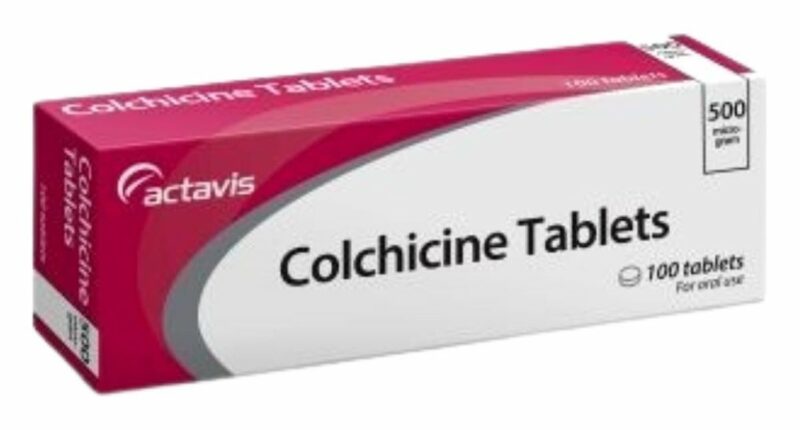Share this @internewscast.com
An affordable medication traditionally used to treat gout may bring new hope to thousands suffering from heart conditions, according to promising new research.
Researchers from Germany and Switzerland conducted a study involving over 10,000 individuals with a history of cardiovascular issues. They discovered that colchicine significantly reduced the risk of heart attacks and strokes among these patients.
Gout, a type of arthritis, is often closely associated with heart disease—a leading cause of heart attacks—and they frequently occur together.
This study adds to the growing body of evidence linking these conditions, offering a potential dual-treatment option with colchicine.
Colchicine, already recommended by the NHS as a primary treatment for gout, works by targeting and inhibiting interleukin-1β, a chemical produced by the body’s cells, thus reducing inflammation.
Gout arises from an accumulation of uric acid in the bloodstream and affects around four percent of adults in the UK, as well as more than eight million people in the US.
It is a form of arthritis, caused by a build-up of uric acid, a waste product of the body, famously afflicted Henry VIII and was rife in the Victorian era.
Gout was believed to be triggered by overindulging on rich foods and alcohol.

Colchicine, which is already the first-line treatment for gout on the NHS , targets and inhibits interleukin-1β — a chemical produced by cells in the body — to reduce inflammation
But research now shows anyone can get the disease – though men are four times as likely to as women.
In the study, researchers analysed 12 trials involving 22,983 people with a history of heart disease, heart attacks and stroke.
Roughly half were given a low dose of colchicine, 0.5mg, for at least six months once or twice a day.
The other half received either a placebo or no additional treatment alongside their usual care.
Researchers found that for every 1,000 people treated, there were nine fewer heart attacks and eight fewer strokes compared to people not taking colchicine.
However, those on the drug were more likely to experience side effects relating to their stomach or digestive system, although these were mild.
Writing in the journal Cochrane Database of Systematic Reviews, the researchers also noted: ‘High-certainty evidence shows that the use of colchicine does not increase the rate of serious adverse events.’
While further larger studies are vital to prove this link, they added: ‘The drug is inexpensive, widely available, and its safety profile is well-established.
‘Consequently, a case can be made for utilising colchicine in treatment to prevent heart attacks and strokes.’
Dr Ramin Ebrahimi, a cardiology expert at the University Medicine Greifswald in Germany and study co-author, said: ‘Reductions like this can make a real difference for patients who live with ongoing, lifelong cardiovascular risk.’
Lars Hemkens, director of clinical trials at the University of Bern in Switzerland and study co-author, also said: ‘These results come from publicly funded trials repurposing a very old, low-cost drug for an entirely new use.
‘It shows the power of academic research to reveal treatment opportunities that traditional drug development often overlooks.’
It comes as alarming data last year revealed that premature deaths from cardiovascular problems, such as heart attacks and strokes, had hit their highest level in more than a decade.
The Daily Mail has previously highlighted how the number of young people, under 40, in England being treated for heart attacks by the NHS is on the rise.
Cases of heart attacks, heart failure and strokes among the under-75s has tumbled since the 1960s.
This is believed to be due to plummeting smoking rates, advanced surgical techniques and breakthroughs such as stents and statins.
But now, rising obesity rates, and its catalogue of associated health problems such as high blood pressure and diabetes, are thought to be one of the major contributing factors.













